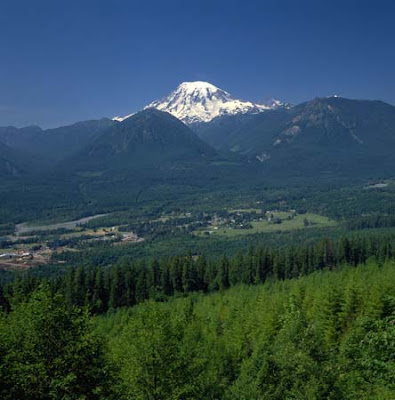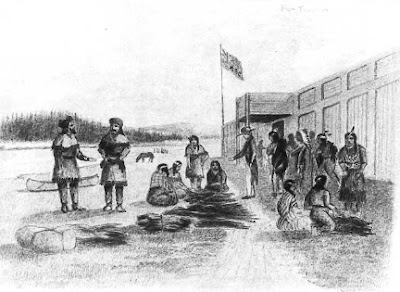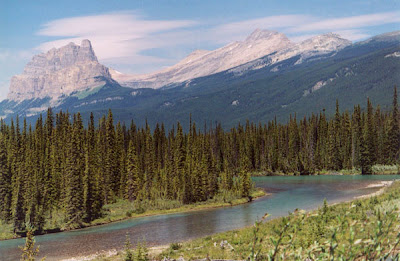14 Jul, 1841.

George Sinpson:
Since we had fallen on the trail of the emigrants, we could observe, by the number if their encampments, that we were marching at three of four times their pace; so that, though they had started twenty-eight days before us, they were overtaken by us next morning after we had been out exactly sixteen in all. From the information of Indians we were looking out for these people; and accordingly, about two hours after winding its course over the plains. These emigrants consisted of Agriculturists and others, principally natives of the Red River Settlement. There were twenty-three families, the heads being generally young and active, though a few of them were advanced in life, more particularly one poor woman, upwards of seventy five years of age, who was tottering after her son to his new home. This venerable wanderer was a native of the Saskatchewan, of which, in fact, she bore the name. She had been absent from this, the land of her birth , for eighteen years; and on catching the first glimpse of the river from the hill near Carlton, she burst, under the influence of old Recollections, into a violent flood of tears. During the two days that the party spent at the fort, she scarcely ever left the bank of the stream, appearing to regard it with as much veneration as the Hindoo [Sic.] regards the Ganges.
As a contrast to the superannuated daughter of the Saskatchewan, the band contained several very young travelers, who had, in fact, made their appearance in this world since the commencement of the journey. Beyond the inevitable detention which seldom exceeded a few hours, these interesting events had never interfered with the progress of the brigade; and both mother and child used to jog on, as if jogging on were the condition of human existence. Each family had two or three carts, together with bands of

horses, cattle and dogs, the men and Lads travelled in the saddle, while the vehicles, which were covered with awnings against the sun and rain, carried the women and young children. As they marched in single file their cavalcade extended above a mile in length; and we increased the length of the column by marching in company. The emigrants were all healthy and happy, living in the greatest abundance, and enjoying the journey with the highest relish.
 Simpson, George. A Narrative of a Journey Around the World: During the Years 1841 and 1842. 2 vols. Philidelphia: Lea and Blanchard, 1847. Pg 62.
Simpson, George. A Narrative of a Journey Around the World: During the Years 1841 and 1842. 2 vols. Philidelphia: Lea and Blanchard, 1847. Pg 62.
Sir. George Simpson, Courtesy of The Ontario Achives
 Second Series 1839-44. London: The Hudson's Bay Record Society, 1943. Pg 71n.
Second Series 1839-44. London: The Hudson's Bay Record Society, 1943. Pg 71n.























-Fort_Carlton.jpg)










